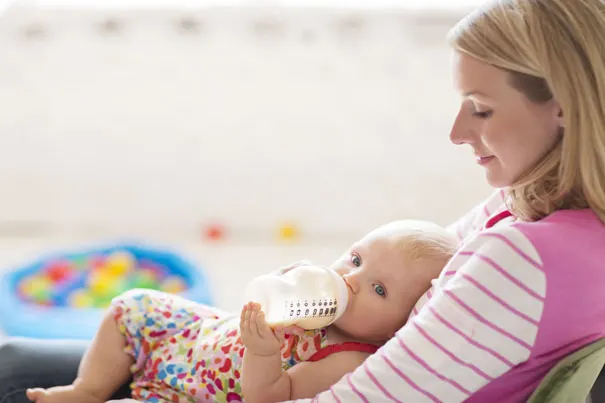Considering Formula? How much to feed and other tips
The moments when you're giving your baby a bottle are wonderful times to feel close and to get to know each other. This way your baby's dad and otherfamily members can do some of the feeding right from the start.
Choosing the Right Formula
Infant formulas are made to meet your baby's nutritional needs, very much like the breast milk on which they're modeled. Most formulas are modified cows'milk, and all standard brands are very similar. Unless your provider tells you otherwise, pick one that is fortified with iron. Formulas come in threetypes of preparations:
ready-to-feed (the most expensive),
liquid concentrate (less expensive), and
powder (the most economical).
Read the mixing directions carefully.
Water and Formula
You don't need to use bottled water in your baby's formula unless there's a problem with your water supply. Check with your healthcare provider and withyour local water utility if you have any questions. After they're six months old, babies also need fluoride. Bottled water may not contain any, and yourwater supply may or may not have adequate quantities.
How Much is Enough?
Newborns start out with a stomach that can hold only one or two teaspoons (five to 10ml). One to two ounces per feeding is usually enough at first, but bythe time your baby is two months old, for example, she'll need 24 to 32 ounces a day and about six to seven feedings in a 24-hour period.
Here's a rough idea of how much formula your baby needs, and how often she needs to be fed:
| Age: | Amount per feeding: | Feeding Frequency: |
| Newborn | 2 to 3 ounces | Every 3 to 4 hours |
One month | 4 ounces | Every 4 hours |
Two months | 4 ounces | 6 to 7 feedings/24 hours |
Four months | 4 to 6 ounces | 6 feedings/24 hours |
Six months | 6 to 8 ounces | 5 feedings/24 hours |
One year | 8 ounces | 2 to 3 feedings/24 hours |
Follow Your Baby's Lead
Remember, each baby is unique and will vary her intake from feeding to feeding, and day to day. Never force-feed her extra formula, and don't leave herstill smacking her lips for more. A baby who spits up often may do better with smaller, more frequent feedings.
Things You Should Know
Washing feeding equipment.If you wash and rinse bottles and artificial nipples carefully – with hot, clean water – boiling or sterilizing them is unnecessary. Be sure to clean outany leftover formula, which can spoil easily and upset your baby's stomach.
Throwing out used formula. Prepared formula can be kept in the refrigerator for 48 hours if the baby hasn't touched the nipple. If she has, throw out whatever remains after afeeding.
Heating formula.Never heat formula in the microwave. Microwaves heat the formula unevenly, and hotspots will burn your baby. Hold the bottle under hot water for a fewminutes to bring it up to room temperature.
Switching formula.Sometimes switching formulas can help settle little digestive problems. Switching to a soy formula can help with allergies, but check with your healthcarepractitioner about any switches.
Different digestion.Formula moves more slowly through the digestive tract, so expect the time between feedings to be a bit longer (three to four hours) and the stools to be abit larger and drier than those of breastfed babies.
Things to Keep in Mind
Hold your baby during feeding.Propping her up with her bottle represents a choking hazard.
Check her diapers.If your baby wets fewer than six diapers each day, call your healthcare provider right away. She may be dehydrated or undernourished.
Make sure the nipple hole is the right size.If it's too large, your baby will gag and look alarmed at the fast milk flow. If she's struggling, the hole may be too small or the nipple too hard forher.
Join Pampers Club and get:




